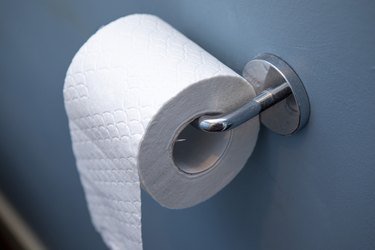
You may have expected to be fatigued or uncomfortable after surgery. But constipated? Unfortunately, yes — it's common to have trouble making a bowel movement after surgery.
Constipation, defined as having fewer than three bowel movements per week or having stools that are hard, dry or difficult to pass, affects up to 40 percent of people recovering from surgical procedures, says Tracey Childs, MD, chief of surgery at Providence Saint John's Health Center in Santa Monica, California.
Video of the Day
Video of the Day
Fortunately, it's also temporary.
Here's why surgery can make it harder to go to the bathroom and how to find relief. Plus, what you can do to reduce your risk for post-surgical constipation.
Causes of Constipation After Surgery
A number of factors can cause constipation or make bowel movements difficult following surgery:
1. Pain Medications
The biggest contributor is pain medications, which may be given both during and after surgery. "Even a single dose of narcotic given during anesthesia can slow things down significantly," Dr. Childs explains.
2. Dietary Changes
Dietary changes can put the brakes on your bowels too. Fasting before surgery means there's less food in your digestive tract to be excreted as stool, explains Vanessa Mendez, MD, a South Florida-based board-certified gastroenterologist.
Also, if you feel nauseous after surgery, the thought of drinking water can be pretty unappealing. "That can also have an effect on constipation," Dr. Childs says, as being dehydrated can dry out your stool and make it harder to pass.
3. Moving Less
Being less active can slow things down too, since moving your body can help move food and waste through your GI tract.
"This is most noted in patients who are actually bedridden, but also in patients who have limited mobility," says Dr. Childs.
4. Type of Surgery
The type of procedure you have can also factor in.
"Abdominal and pelvic surgeries are more likely to cause constipation because you're instrumenting the bowel, which causes a temporary bowel shock to your system," says Dr. Mendez.
How to Treat Constipation After Surgery
1. Pay Attention to Your Diet and Fluids
Drinking plenty of water and eating fiber-rich foods are the most effective home remedies for easing constipation, whether the problem stems from surgery or something else.
"I recommend getting at least half of your body weight in ounces of water," Dr. Mendez says. If you weigh 150 pounds, for instance, aim to drink 75 ounces (or about nine cups) of water daily.
Fruits, vegetables, whole grains, beans, nuts and seeds are all good fiber sources. But certain foods may pack an extra anti-constipation punch: Prune juice contains sorbitol, a naturally occurring sugar alcohol with laxative-like properties, says Dr. Mendez. Whole prunes and kiwifruit (a go-to among GI doctors) are helpful as well.
Indeed, eating about 10 prunes or two kiwifruits daily effectively eased chronic constipation in a June 2021 randomized controlled trial in the American Journal of Gastroenterology.
2. Consider OTC Medications
Over-the-counter medications are another good option. Common laxatives used to combat postoperative constipation include MiraLAX ($24.82, Amazon) and magnesium citrate ($0.99, Target.com), Dr. Childs says.
Prefer something a little gentler? Colace ($8.99, Amazon) or mineral oil ($2.49, RiteAid.com) are some of the best stool softeners after surgery. "Stool softeners alone work in a different and slower way," Dr. Childs says.
3. Don't Try Too Hard
When you do head to the bathroom, resist the urge to spend long period sitting and trying to go. Straining or spending long stretches on the toilet can actually worsen constipation and increase the risk for hemorrhoids, according to the Mayo Clinic.
How Long Does Constipation Last After Surgery?
Bowel problems after surgery typically only last for a few days, Dr. Mendez says. If you're taking prescription pain medications, the problem could persist until you stop."These are a known cause of constipation and slow down the movement of the bowel," she explains.
Can You Prevent Constipation After Surgery?
Many of the same strategies used to treat constipation can also help prevent it in the first place, notes the National Institute of Diabetes and Digestive and Kidney Diseases (NIDDK).
"After surgery, make sure you're getting enough fiber in your diet in the form of smoothies, soups and fresh fruit to restart your bowels and get things going," Dr. Mendez recommends. "You also want to make sure you're drinking enough water, and come off the pain medications as soon as you feel comfortable."
One of Dr. Mendez's favorite constipation-fighters is a green smoothie made with fruit, leafy green vegetables, oats, flaxseeds or chia seeds and nondairy milk (because dairy can sometimes worsen constipation).
"Drinking a green smoothie daily will ensure you're getting sufficient soluble and insoluble fiber to help bulk up stools and get your bowels moving," she says.
Finally, try to gently move your body within a few hours of surgery, as soon as you get permission to do so.
"Movement can be hard and painful after surgery. But the sooner you move, the faster your digestive system will get going," Dr. Mendez says. A short walk up and down the hallway is a good place to start.
When to Call the Doctor
Let your doctor know if you haven't had a bowel movement within three to four days after surgery, Dr. Childs recommends. It's not normal to be constipated a week after surgery, so don't wait that long to act.
"The longer it takes to go, the more difficult it will be," she says.
You should also call your doctor if you experience severe bloating, abdominal pain, nausea or vomiting; are passing blood or mucus (with or without stool); or if you are unable to urinate. These could be signs of an infection.
Was this article helpful?
150 Characters Max
0/150
Thank you for sharing!
Thank you for your feedback!
Is this an emergency? If you are experiencing serious medical symptoms, please see the National Library of Medicine’s list of signs you need emergency medical attention or call 911.


